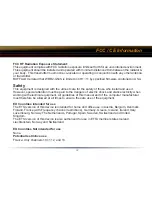
86
IP (Internet Protocol) Address:
A unique 32-
binary-digit number that identifi es each sender
or receiver of information sent in packets.
Infrastructure:
A wireless network or other
small network in which the wireless network
devices are made a part of the network through
the Access Point.
ISP (Internet Service Provider):
A company
that provides access to the Internet and other
related services.
IV (Initialization Vector):
The header section
of an encrypted message packet.
LAN (Local Area Network):
A group of com-
puters and peripheral devices connected to
share resources.
LED (Light Emitting Diode):
The lights on
a hardware device representing the activity
through the ports.
MAC (Medium Access Control) Address:
A unique number that distinguishes network
cards.
Mbps (Mega Bits Per Second):
A measure-
ment of millions of bits per second.
MDI/X (Media Dependent Interface/Cross-
over):
Port on a network hub or switch that
crosses the incoming transmit lines with the
outgoing receive lines.
MHz (MegaHertz):
One million cycles per
second.
NAT (Network Address Translation):
An inter-
net standard that enables a LAN to use one set
of IP addresses for internal traffi c and a second
set for external traffi c.
NIC (Network Interface Card):
An expansion
card connected to a computer so the computer
can be connected to a network.
Packet:
A block of data that is transferred as a
single unit, also called a frame or a block.
Packet Filtering:
Discarding unwanted net-
work traffi c based on its originating address or
its type.
Glossary










































